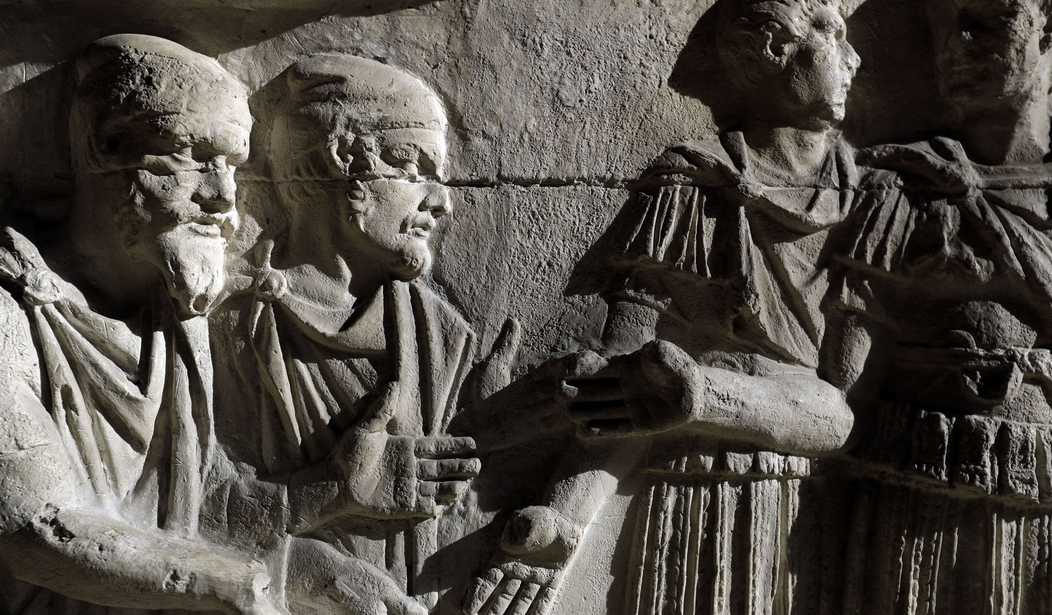Continuing my popular series of Things I Like, I wanted to turn you on to some of the best history podcasts you can find: Mike Duncan’s two podcasts, The History of Rome and Revolutions.
I discovered Mike’s first podcast, The History of Rome, for the same reason he started it: the paucity of alternatives when he started it (2007). I started listening to it sometime in 2008 or 2009, and it was already among the most popular history podcasts available.
The first several episodes were rough, and I almost dropped it. Mike hadn’t done any podcasting before he started it, and it took him a while to get the sound quality, the storytelling, and the pacing up to standard. Still, the material was so interesting that I decided to soldier on.
And boy, was it worth it. Once Mike got into the groove, I began learning so much and getting so engrossed in the stories that I couldn’t wait for the next episodes. Unlike many podcasts, which mimic talk radio, a history podcast tells a linear story, and if done well, you want to know what comes next. I admit to being frustrated because I was binge-listening, and for some reason, Mike couldn’t keep up with my voracious appetite for his content.
I later learned that he had to work and sleep. Who knew? Stupid human limitations!
The History of Rome extends from the city’s founding to the collapse of the Western empire–the Eastern empire soldiered on for a millennium longer than the Western one. You can learn why there was even an Eastern empire in Mike’s podcast, but you will have to seek other sources for what happened after the collapse of the Western half.
The podcast lasted five years and 179 episodes, and I highly recommend it. Mike wrote a book called “The Storm Before the Storm,” which focused on the generations during which the Roman Republic began to show cracks that eventually led to its transformation into an autocracy when the emperors took power. Many people have noted that this period of democratic decline mirrors what is happening in the United States today.
Duncan’s “Revolutions” podcast is more ambitious still, covering ten revolutionary periods of the modern era:
- English Revolution, aired September 2013 to January 2014 (16 episodes, 4 supplementals)
- American Revolution, aired February to May 2014 (15 episodes, 2 supplementals)
- French Revolution, aired July 2014 to November 2015 (55 episodes, 5 supplementals, 1 PSA)
- Haitian Revolution, aired December 2015 to April 2016 (19 episodes, 1 supplemental)[21]
- Spanish American wars of independence, aired June 2016 to February 2017 (27 episodes, 1 supplemental)
- July Revolution, aired March to May 2017 (7 episodes, 5 supplementals)[22]
- Revolutions of 1848, aired July 2017 to April 2018 (33 episodes, 0 supplementals)
- Paris Commune, aired from May 2018 to June 2018 (8 episodes, 0 supplementals)
- Mexican Revolution, aired August 2018 to March 2019 (27 episodes, 0 supplementals)[23]
- Russian Revolution pt 1, aired from May 2019[23] to April 2020 (39 episodes, 0 supplementals)
- Russian Revolution pt 2, aired from 3 January 2021 to July 2022 (64 episodes, 11 supplementals) [24]
I can’t stress too much just how much content (and analysis) is packed into these seasons and how much I learned from listening to them. For one thing, I had zero interest in the Haitian revolution, and, boy, did I learn how interesting it is.
All of them are worth listening to, but perhaps the most important ones in which you will learn the most d are the seasons covering the French Revolution through the Paris Commune–you will learn so much about the events and history that shaped the modern world and why (until recently) America has been much more stable historically than almost anywhere else in the world.
It’s a ton of content and a big investment of time, but if you listen to all 11 seasons, you will get a real sense of why the Western world looks as it does today.
Duncan wrote a book on the Marquis de Lafayette, an important figure in both the American and French Revolutions, called “Hero of Two Worlds.” Both his books have been bestsellers.
Now to Duncan: he is a fascinating character, and like David Crowther of The History of England, whom I featured a couple of weeks ago, he is not a professional historian. Both are enthusiasts; as enthusiasts, they have a better sense of what people like you and me seek in our history.
They are both rigorous in their research, but rather than being dry and theory-driven, they give you the facts and the context you are likely seeking without the often bizarre obsessions that professional academics focus on.
While recording The History of Rome, Mike Duncan was a fishmonger–he is one of those guys who is both well-educated and well-grounded in reality. There are far too few such people; fewer still get to change careers and live out their dreams.
Duncan has been so successful that he has become a celebrity and made a career out of being an exceptional storyteller. Good on him!
Duncan is taking a break from podcasting, but I hope he comes back on the scene soon.
So, if history interests you, I commend Mike Duncan’s work to you. He is an extraordinary talent from whom you will learn a lot about both the past, which is interesting enough and, more importantly, the forces that have shaped our world today.








Join the conversation as a VIP Member